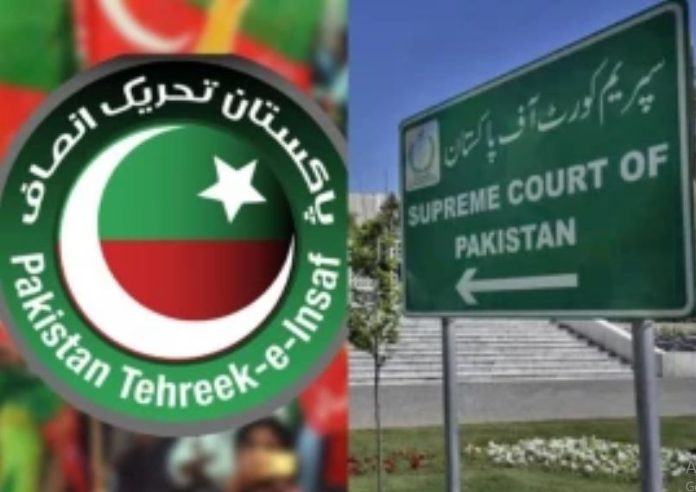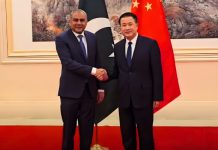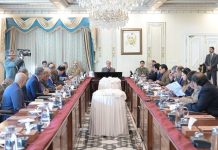——- PTI declared eligible for reserved seats
——- In major legal victory for PTI, SC declares party eligible for reserved seats
——- Apex court nixes PHC and ECP’s verdicts
——- Majority ruling decided with ratio of 8:5
——- PTI was and is a political party, rules Court
——- PTI leaders hail Judiciary after victory in reserved seats case
——- PTI’s Ayub demands immediate resignation of CEC
Staff Report
ISLAMABAD: In a major legal victory for the Pakistan Tehreek-e-Insaf (PTI), the Supreme Court on Fri-day ruled that the party is eligible for the allocation of reserved seats.
The decision has not only paved the way for the PTI’s return to the parliament, which was kicked out of the February 8 polls owing to the ECP’s December 2023 ruling, but has also increased the pressure on the coalition alliance by changing the composition of the National Assembly.
Justice Mansoor Ali Shah of the SC’s full bench announced the 8-5 majority verdict, nullifying the Pesh-awar High Court’s (PHC) order wherein it had upheld the Election Commission of Pakistan’s (ECP) deci-sion denying the reserved seats to the SIC. It was supported by a majority of eight judges, comprising Justice Syed Mansoor Ali Shah, Justice Mu-nib Akhtar, Justice Muhammad Ali Mazhar, Justice Ayesha A. Malik, Justice Athar Minallah, Justice Syed Hasan Azhar Rizvi, Justice Shahid Waheed and Justice Irfan Saadat Khan.
The PTI candidates did not contest the polls on a single symbol, forcing them to join hands with the Sunni Ittehad Council (SIC), but that could not get the party the reserved seats as the ECP ruled against them.
In its decision today, the court declared that the lack or denial of an election symbol does not in any manner affect the Constitutional or legal rights of a political party to participate in an election, whether general or by, and to field candidates and that the commission is under a Constitutional duty to apply all statutory provisions accordingly. Some jurists, during the proceedings, had noted that the apex court had not ruled that the PTI could not participate in the general elections as a political party, and that the commission had misinterpreted the top court’s verdict.
“PTI was and is a political party, which secured general seats in the national and provincial assemblies in the general elections of 2024,” read the verdict. According to the verdict, the PHC’s judgment dated March 25 is set aside. “The order of the ECP dated March 1 is declared to be ultra vires to the Constitu-tion, without lawful authority, and of no legal effect,” it said.
The top court remarked that PTI, as a political party, has a legal and constitutional right to reserved seats.
Rejecting the appeals filed by the SIC, the apex court said that the party cannot take reserved seats as per the Constitution.
The ruling said that the PTI should present a list of eligible candidates for the reserved seats to the electoral body within 15 days after the verdict.
It added that the ECP should then publish the list of reserved seats of the candidates on its website within seven days.
“The seats allocated to the PTI after this stage will be considered as their seats. [Once the PTI gets its seats in parliament], it will be eligible for the reserved seats,” said the ruling.
However, Chief Justice of Pakistan (CJP) Qazi Faez Isa and Justice Jamal Khan Mandokhail had a differ-ing order, which was supported by Justice Amin-ud-Din Khan and Naeem Akhtar Afghan.
Meanwhile, Justice Yahya Afridi differed with it, stating that the PTI fulfils the conditions prescribed for a political party under the enabling provisions of the Constitution and the law to allocate reserved seats for women and non-Muslims, but SIC doesn’t.
He directed the ECP to decide the allocation of reserved seats for women and non-Muslims to political parties in the NA and provincial assemblies, after hearing all the parties concerned, and revisit its earli-er decisions, within seven days.
The reserved seats issue first emerged after over 80 Pakistan Tehreek-e-Insaf (PTI) backed independ-ent candidates emerged victorious in the February 8 elections and subsequently joined the SIC in a bid to claim seats reserved for minorities and women.
The SIC then approached the ECP on February 21 seeking allocation of reserved seats. However, the PTI suffered a setback after the electoral body, citing the party’s failure to submit its list of candidates, denied allocating the reserved seats to the SIC via its 4-1 majority verdict on March 4.
In the verdict, the ECP said it extended the deadline to submit a priority list for the reserved seats of women, and the SIC, before the February 8 polls, did not submit the required list which was “manda-tory”.
The electoral body’s verdict cited Article 51(6), saying the article clearly stated the reserved seats would be allocated to the political parties who contested elections and won general seats based on a “proportional representation system”.
While rejecting the plea of SIC, the ECP accepted applications of the opposing parties and decided that the seats in the National Assembly would not remain vacant and be allocated by a proportional repre-sentation process of political parties on the basis of seats won by political parties.
The electoral body said the SIC cannot claim the share in the reserved seats for the women “due to non-curable procedural and legal defects and violations of mandatory provisions of the Constitution”.
The party then approached the PHC on March 6, which upheld the electoral body’s decision on the matter in its March 14 ruling.
Subsequently, on April 2, the SIC moved the SC seeking to set aside the PHC verdict and the allocation of 67 women and 11 minority seats in the assemblies.
The allocation of reserved seats holds significance as the PTI-backed independent candidates, who make up the majority of the opposition benches, lost as many as 77 reserved seats in NA and provin-cial assemblies due to the PHC’s verdict.
It is to be noted that the PHC verdict allowing the allocation of reserved seats to the ruling coalition comprising the Pakistan Muslim League-Nawaz (PML-N), the Pakistan Peoples Party (PPP) and others, led to them securing a two-thirds majority in the National Assembly.
In the National Assembly, the PML-N was allocated 14 seats and the PPP and the Jamiat Ulema-e-Islam-Fazl (JUI-F) were given five and three additional seats, respectively.
The move propelled the PML-N’s number in the lower house to 123, and PPP to 73, whereas the PTI-backed SIC number stood at 82.
In the Khyber Pakhtunkhwa Assembly, the JUI-F was given 10 seats, the PML-N was allocated seven, whereas the Awami National Party got one reserved seat.
In Punjab, the PML-N got 23, the PPP secured two, whereas the Istehkam-e-Pakistan Party (IPP) and the Pakistan Muslim League-Quaid (PML-Q) got one reserved seat each.
Meanwhile, in Sindh Assembly, the PPP and the Muttahida Qaumi Movement were allocated two and one seats, respectively.
A three-member SC bench comprising Justice Mansoor, Justice Minallah and Justice Mazhar, took up the SIC’s plea on June 6 and suspended PHC’s verdict as well as the ECP’s decision on the said issue.
Following the SC’s decision to suspend the ECP order, the coalition lost its two-thirds majority in the lower house.
A 13-member full-court bench, constituted on May 31, then took up the issue and held a total of nine hearings on the crucial matter — the first hearing being conducted on June 3.
The SIC’s plea, however, was opposed by both the federal government and the electoral body.
In its submission to the court via Attorney General of Pakistan (AGP) Mansoor Usman Awan, the gov-ernment urged the apex court to reject the SIC’s plea stressing that the reserved seats for minorities and women could be given to a political party which contested the polls and won at least one seat be-sides providing a list of candidates based on the total number of seats it won as per the law.
Meanwhile, the ECP also adopted a somewhat similar argument contending that the party is not eligi-ble to get reserved seats as it did not submit the list of candidates before the January 24 deadline.
Furthermore, the PML-N also submitted its written arguments before the court that the SIC is not en-titled to the reserved seats as it neither contested the February 8 polls nor provided the list of candi-dates.
It also argued that the party didn’t win a single seat, which as per the written submission, was neces-sary to qualify for the allocation of reserved seats.
“None of the members of SIC contesting for the reserved seats filed their nomination papers let alone with the mandatory requirement of filing them with the list,” it said, adding that since the nomination papers were never filed, the same were never scrutinised and none was held eligible to contest the elections.
Earlier, The Pakistan Tehreek-e-Insaf (PTI) has hailed the Supreme Court’s (SC) verdict on the alloca-tion of reserved seats as a ‘historic decision’ in the country’s history.
“We finally got what we deserved,” PTI chairman Barrister Gohar Ali Khan said while speaking outside the apex court along with other PTI lawmakers following the Supreme Court’s announcement of its verdict on Friday.
The chairman said that “today is a day of happiness for the 250 million people of Pakistan.”
He noted that 11 judges of the top court voted in favour of PTI and also expressed gratitude to the judiciary for deciding in favour of the party.
“The greatest contribution was from KP Chief Minister Ali Amin Gandapur. He delayed the oath in the KP Assembly. There is no question of re-election,” Gohar added.
“The Supreme Court has granted the right to its rightful owner today,” Sunni Ittehad Council (SIC) leader Sahibzada Hamid Raza.
He criticised the Election Commission, accusing it of attempting to steal the mandate, and highlighted the Supreme Court’s lack of confidence in the electro watchdog. Raza demanded the immediate resig-nation of the chief of ECP.
“We aim to uphold democracy in Pakistan,” PTI’s senator Shibli Faraz stated.
He emphasised that the current government was established based on Form-45 and called for the res-toration of the mandate.
Faraz praised the courts for allocating them the reserved seats, paying tribute to their decision to “up-hold the flag of justice”.
Leader of the Opposition in the National Assembly (NA) Omar Ayub Khan demanded the immediate resignation of the chief election commissioner (CEC) following the Supreme Court’s decision to allocate reserved seats to PTI.
“Chief Election Commissioner Sikander Sultan Raja, along with the remaining 4 commissioners of the Election Commission, should resign promptly,” Ayub stated.
“The Election Commission was biased against him[Imran Khan] and his party,” he added.
The Supreme Court of Pakistan in its verdict said that Pakistan Tehreek-e-Insaf was entitled to re-served seats and that the Election Commission of Pakistan (ECP)’s decision to allocate reserved seats to the ruling coalition was unconstitutional.
During the announcement, PTI leaders chanted slogans on the SC premises.
Before the announcement today, Chairman Barrister Gohar expressed optimism about the allocation of their reserved seats while speaking to the media in Islamabad.
Barrister Gohar stated that the wait for the public is nearing its end and they are hopeful for a favora-ble decision from the Supreme Court.
“This is an issue of the basic rights of 250 million people,” Barrister Gohar remarked, emphasizing the significance of the matter. He expressed confidence that PTI would receive their due seats, which he believes will strengthen democracy in the country.




